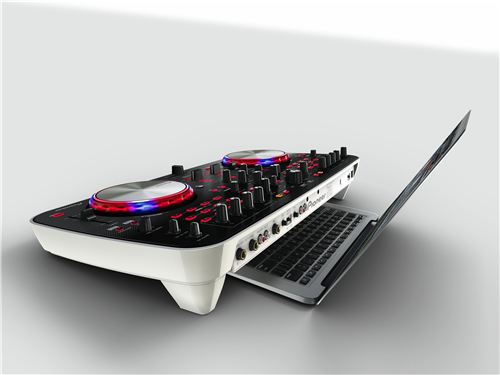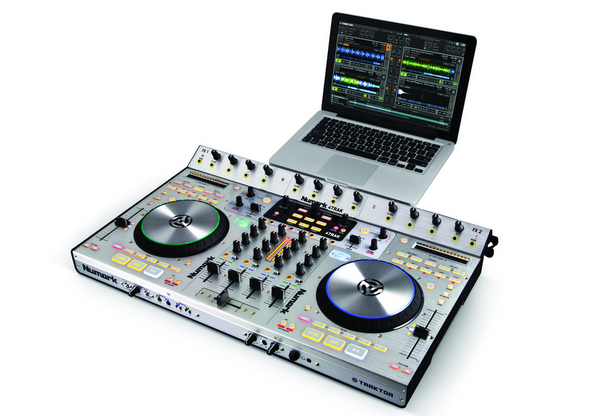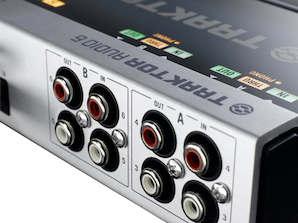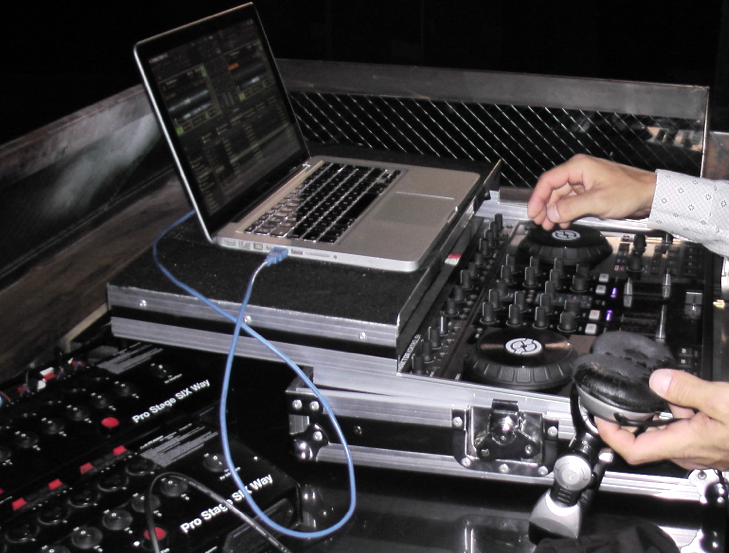
As I’m sure you’ve seen, eyes raise and questions arise when non-DJs, club promoters or even non-digital DJs see you with your digital DJ controller. When you respond to their questions with, “I prefer DJing with controllers and laptops,” minds can boggle and mouths gape as the questioners stumbles to grasp the notion of someone who doesn’t use “real” gear.
Eventually though, they fire off responses, challenges and proclamations. This isn’t right, it’s not DJing, anyone can be a DJ nowadays, there’s no skill in it, you’re taking “our” jobs, you’re cheating. Of course, not all people are personally offended by digital DJing; some are just curious and a bit unbelieving as to what’s possible nowadays.
So we thought today we’d take a look at six of the most popular and prevalent questions and then try to come up with some good responses to them. I’ll give both a longer response and a more succinct version, the second being the kind of thing you can get comfortable saying to people in an elevator (or a club washroom!):
1: “Ooooh, that’s a cool DJing toy!”
It can hurt a little, this one. After all, much DJ gear looks like “real” gear, only smaller. Tiny jogwheels add to the impression (“Aren’t they cute?”) of toy-dom. It doesn’t help the cause when certain gear has lots of flashing lights, and is made of the same plastic as games consoles and other consumer gear.

You can avoid this by choosing carefully in the first place. Nobody could accuse the larger-form DJ controllers like the Numark NS6 or the Pioneer DDJ-T1 and Pioneer DDJ-S1 of being toy-like; in these cases, the Numarks are big and heavy, the Pioneers are plastic but at least look like “real” DJ gear. Likewise, Traktor gear like the Kontrol S4 looks kind of professional, with its sober styling and jogs relegated to the back of the units. Choose what suits you.
Let’s be honest, though, much DJ gear – even the good stuff – does look like home versions of the “real thing”. And to an extent, it is. The fact is, though, playing with it most definitely isn’t like playing with a toy. The basic skills of DJing remain the same whether you’re using a €99 Hercules DJControl Instinct or a full-blown Pioneer DJM-2000s-plus-club-mixer set-up.
What to say: “You know, you don’t really need all that big gear to DJ with. Think of how video cameras have shrunk, or all the things your smartphone can do. Digital has made it possible to DJ with much more convenient gear – even that same smart phone, in fact! But the skills are still the same. It’s still the same thing we’re doing.”
2. I don’t understand! Where’s it playing the music from?
Initially it’s sometimes hard for people to work out what exactly is happening with a DJ controller and laptop. They think the “music” is in the “box” – that it’s like a big iPod with controls on it. You can’t blame them – that kind of gear does, after all, exist (think Stanton SCS.4DJ).

If they get their heads around the fact that the controller is “controlling” the software on the computer, their next misunderstanding is often thinking that the audio that started as a file on the computer actually also comes from the computer, rather than from the controller (or from your audio interface).
(Again, who can blame them? If you install Virtual DJ Home or another software-only solution, the music does indeed come from your computer until such time as you step up to a separate audio interface or controller with a built-in sound card.)
If you’re using a digital vinyl system (such as the Rane/Serato SL2), it’s often game over for trying to explain what they hell’s going on to someone who’s never seen such a set-up before!
What to say: “The music’s is on my hard drive as digital files, all this gear does is take those files and turn them into a really high quality audio, and lets me control the software.”
3. Digital DJing is cheating isn’t it? Doesn’t the computer do all the work for you?
You can’t really blame people for thinking this. After all, in many bars and even some clubs (Latin clubs round where I live do this a lot), there is indeed an automated playlist that just churns through the tunes one by one without anyone being there to do the actual DJing.

And while there are those who know full well what the computer can and can’t do, and who are just trying to bait you with this question, it’s always best not to rise to the bait.
Let me tell you a story. When I DJed with vinyl, I spent most of my time looking for the perfect next tune to play. While I was quite capable of pulling tricks with the decks when I wanted to, my workflow more usually consisted of dancing around in my DJ box to get into the vibe, and thinking hard about the exact perfect record I wanted to hear next.
Often, I’d decide with 30 seconds to spare, and it was only my years of experience that ensured I could get it cued up and mixed in without anyone noticing. Job done.
As I say, it took me many years to get that proficient. Thanks to digital, though, all that’s changed for the better. Now, you can 1. Browse your music far more efficiently than I ever could. 2. Have more of it with you than I could ever carry, and 3. Quickly mix from one tune to the next far more easily, without making a fool of yourself.
That means that nowadays, if you have great taste (really important), and you can work out what to play next (just as important), digital makes the technicalities far easier or you. What’s wrong with that? How much of all of that is the computer doing for you? Very little. Is it cheating? I don’t think so. It’s giving you the best tools that are available to do the job you’ve turned up to do.
What to say: “Don’t worry, it’s still me doing it! I’m still deciding what to play next. I’m still doing the mixing. The brilliance of digital is that it gives me as much time as possible to concentrate on picking out the best tunes to play to keep the party rocking. Unless you think an accountant is cheating by using a calculator, this isn’t cheating.”
4. “Everyone can be a DJ nowadays. I think DJing’s gone downhill since this digital stuff came along…”
This one actually really upsets me, because it tries to do two things that are harmful. Firstly, it discourages people with a passion for music from having a go at DJing. Secondly, it makes out that DJing is something elitist, that only a hallowed few have the right to participate in it. The first is mean-spirited, the second just plain wrong.
True, “everyone” can be a DJ if they have a couple of hundred dollars to get some basic gear to add to their laptop. But the investment of time, money and effort needed to begin to get good at DJing is considerable. For example, here’s an excerpt from the Digital DJ Tips beginners’ crash course in DJing. Do you think you could really find the time to properly follow a course like this unless you were genuinely committed to becoming a good DJ?
While the course – called How to Digital DJ Fast, by the way – has been proven to get you good enough to play in front of an audience after just one month (here’s some testimonials), it’s going to be a pretty intensive month! Plus this only gives you the launchpad (a gig under your belt, which is more than most bedroom DJs ever achieve) to then start your real learning about DJing. I’ve been DJing for 20 years and I still learn new stuff all the time.
Secondly, DJing is more skill than talent. Yup, you need to love your music, and yes, you need to be fascinated by dancefloors and dance culture, but once you’ve got yourself in that ballpark, it’s practise, practise, practise. So yeah, everyone can read a quickstart and get some music coming out of the speakers, but that doesn’t make you a DJ. Plus, the more people who try it, the more great DJs will bubble to the top.
What to say: “True, more people than ever can dabble in DJing, just like YouTube means more people than ever can share videos, but that doesn’t make every YouTube account holder a professional film producer, just like it doesn’t make every laptop DJ a real DJ. Those of use who care about it practise hard, and are just as annoyed with bad DJing when we hear it as you are – probably more so, as we’re more likely to notice it!”
5. “Why don’t you just use the gear that’s already in the DJ box? Why do you insist on plugging your little controller in?”
To be completely honest, there are two answers to this question, and it depends on the type of DJing you do. If you consider yourself a “controllerist”, pushing the boundaries of performance and using loops, effects, samples, live remixing and so on, then you simply can’t do a lot of that stuff with a couple of CDJs or two turntables and a mixer.
But if you’re more a selector-style of DJ, mixing, you know, tunes one after the other, there’s actually not much reason why you couldn’t use the gear that’s already at a venue you’re DJing at. You’ll need your music on CD or USB, sure (or to play it through a digital vinyl system, of course), but ultimately the only thing stopping you doing so would be an an inability to use club gear, due to having never learned.

In this second case, you can see how people may conclude you’re not a “real” DJ. You can’t play “back to back” on standard gear with other DJs, and you can’t do a quick set on what’s in front of you without setting up your fiddly controller and so on.
Ultimately this one is your call. If you want to learn how to use “real” DJ gear, it’s definitely worth doing and will make you a more rounded DJ, but there are hurdles (real manual beatmatching being the main one), and you may find it’s not so much fun as using a controller. But while things are changing, the truth is that even today, most top DJs are still using CDJs in clubs, not all-in-one DJ controllers. If you want to be one, you’ll probably need to learn at some point.
What to say: I can do loads more on this gear than with standard club gear, even though club gear looks far more flashy! If it’s a really short set or there’s some other reason, it might make sense for me to use what’s already there, but to fully perform the way I like, it’s well worth the small extra effort of plugging my kit in.”
6. “You and DJs like you are taking our work, playing for less money and driving us out of the game.”
In my experience, this is the kind of comment that you get from older DJs whose gigs frankly would have dried up anyway, no matter what the DJs coming up behind them were using as gear.
As our writer Dennis Parrott said in his 5 Things I Wish I’d Known About DJing At 18, you need to treat yourself as a business. If your product’s not selling, it’s time to repackage. If you’re not fulfilling a need, you’re destined to become irrelevant. If you can’t play minimal tech house to packed-out venues any more, work out why and go where the demand is! And if the demand for what you want to do in your heart isn’t there any more, then you can hardly blame digital DJs for that.
Where there is a point to be made is in people pirating music and software and literally performing for nothing because they can. These people who don’t pay for things, and who then go on to play in respectable venues in places where legitimate DJs also play? Well, they really have no leg to stand on. But that’s not you, is it?
What to say: “I do my best to make everyone happy with my DJing, and I deserve to get paid what I can for it. I wish you nothing but luck in your own DJing, but please don’t accuse me of undermining you – after all, if it wasn’t me, don’t you think it would be someone else? Things are how they are.”
Finally…
Whenever you deviate from the norm, people are going to ask questions and try to challenge you – especially if they have vested interests. That’s fine and totally understandable. Remember – there was a time when the idea of digital DJing was new and maybe even a little crazy to you, too!
We are different. And people are going to react. They’re going to be defensive, inquisitive, accusatory, or all of the above. So try not to go on the defensive yourself. Try to maintain composure. This is a time to educate, and perhaps even inspire. Use it!
I know I didn’t cover everything. I must have missed more than a few. So, readers, tell me: what else do people say when they first see your digital DJ gear, and how do you react?





![Getting Kids Into DJing, DJing With Disabilities, Small USB Controllers [Podcast] Getting Kids Into DJing, DJing With Disabilities, Small USB Controllers [Podcast]](https://cdn.digitaldjtips.com/app/uploads/2024/03/20175506/podcastwebsiteidea-150x150.jpg)
![How To DJ Warm Up Sets [Live DJing Q&A With Phil Morse] How To DJ Warm Up Sets [Live DJing Q&A With Phil Morse]](https://cdn.digitaldjtips.com/app/uploads/2023/06/10150042/546463301-warmpup-blank-website.jpg)
![Bluetooth For DJs, Rotary Mixers, Cheap DJ Controllers [Podcast] Bluetooth For DJs, Rotary Mixers, Cheap DJ Controllers [Podcast]](https://cdn.digitaldjtips.com/app/uploads/2024/03/21225022/podcastwebsiteidea2-150x150.jpg)